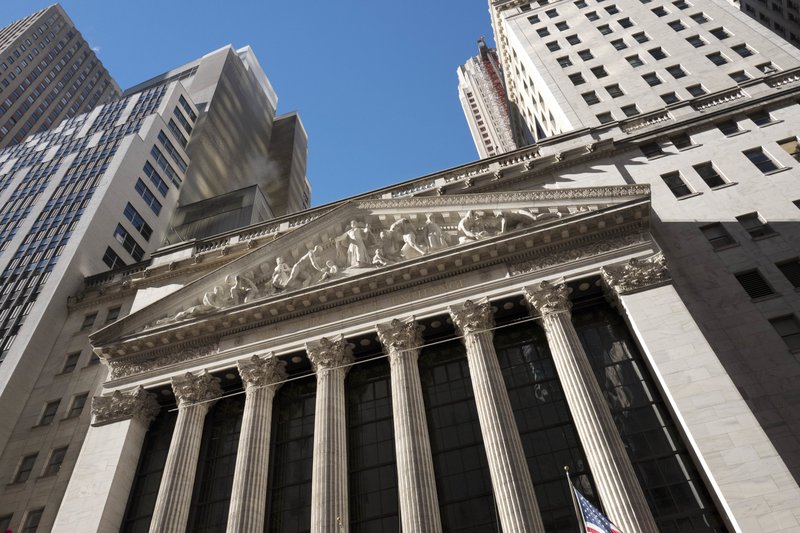NEW YORK -- U.S. stocks plunged Thursday as losses for Cisco Systems hurt technology companies while Wal-Mart declined after its latest quarterly report. Banks also dropped as bond yields and interest rates sank for a second day.
It was the second-worst day for stocks this year, which has seen few large declines. Along with technology companies and retailers, transportation companies skidded, and all of the industrial, financial and basic-materials companies in the Standard & Poor's 500 fell. Those sectors tend to struggle when investors are concerned about economic growth, although there weren't any specific signs of economic trouble Thursday.
The S&P 500 index fell 38.10 points, or 1.5 percent, to 2,430.01, its lowest close since July 11. The Dow Jones industrial average tumbled 274.14 points, or 1.2 percent, to 21,750.73. The Nasdaq composite sank 123.19 points, or 1.9 percent, to 6,221.91. The Russell 2000 index of smaller-company stocks fell 24.59 points, or 1.8 percent, to 1,358.94.
High-dividend stocks like utilities and real estate companies fared slightly better than the rest of the market, although they still finished lower. About 95 percent of the companies in the S&P 500 finished with losses.
Bill Northey, chief investment officer at U.S. Bank Wealth Management, said that minutes released Wednesday from the Federal Reserve's policy meeting last month marked "a little bit of a change in tone," and suggested that the central bank is becoming more cautious about raising interest rates.
That helped push long-term interest rates in the bond market lower since then. Lower bond yields tend to hurt banks, because it prevents them from charging higher rates on loans, and benefits high-dividend stocks.
Investors also were assessing the state of President Donald Trump's business-friendly agenda as he continues to face criticism over his comments after the violence in Charlottesville, Va., over the weekend. After he was elected, investors hoped his proposals for tax cuts and infrastructure spending would improve corporate profits.
"Most of the agenda ... has been a little bit distracted by noneconomic factors," said Northey.
Investors also looked for safer investments after a deadly van attack in Barcelona.
Cisco Systems fell $1.30, or 4 percent, to $31.04 after it said sales will decline in the current quarter. It's expecting a decline of 1 percent to 3 percent from the $12.4 billion in revenue it reported a year ago.
Data-storage company NetApp offered a forecast for the current quarter that disappointed investors. Its stock lost $2.85, or 6.7 percent, to $39.56. It had a lot of company. Apple retreated $3.08, or 1.9 percent, to $157.87 while software maker Adobe Systems skidded $3.57, or 2.4 percent, to $148.23 and chipmaker Texas Instruments fell $2.31, or 2.8 percent, to $80.15.
Wal-Mart did better than analysts expected in the second quarter as shoppers spent more money on its website and more people went to its stores. But that wasn't enough to sustain a recent rally in the company's stock, and its shares lost $1.28, or 1.6 percent, to $79.70.
L Brands, the parent of Victoria's Secret, tumbled after it cut its annual profit forecast because of weakening sales. The stock retreated $1.40, or 3.6 percent, to $37.55, and it's down 43 percent this year as retailers slump overall and the company struggles after it decided to stop selling swimwear.
Elsewhere, Amazon fell $17.61, or 1.8 percent, to $960.57 and shares of Macy's fell 52 cents, or 2.6 percent, to $19.62.
Despite some shaky reports Thursday, it's been another strong quarter of corporate earnings. Per-share profits for S&P 500 companies have grown almost 11 percent in the second quarter versus the same period a year ago. Profits for energy companies have quadrupled because the price of oil has stabilized, and technology companies also have posted big gains. Consumer-focused companies have made smaller gains.
Analysts, including U.S. Bank's Northey, mostly expect the stock market to keep rising as long as company profits keep growing.
The only bigger loss for stocks this year came on May 17. At that time, investors were concerned that Trump's pro-business agenda might be affected by allegations he asked the FBI to drop an investigation into former national security adviser Michael Flynn.
Bond prices rose. The yield on the 10-year Treasury note fell to 2.19 percent from 2.23 percent. The yield on the two-year note fell to 1.29 percent from 1.33 percent.
Benchmark U.S. crude rose 31 cents to $47.09 a barrel in New York. Brent crude, used to price international oils, added 76 cents, or 1.5 percent, to $51.03 a barrel in London.
Gold rose $9.50 to $1,292.40 an ounce. Silver added 11 cents to $17.05 an ounce. Copper lost 2 cents to $2.94 a pound.
Business on 08/18/2017

